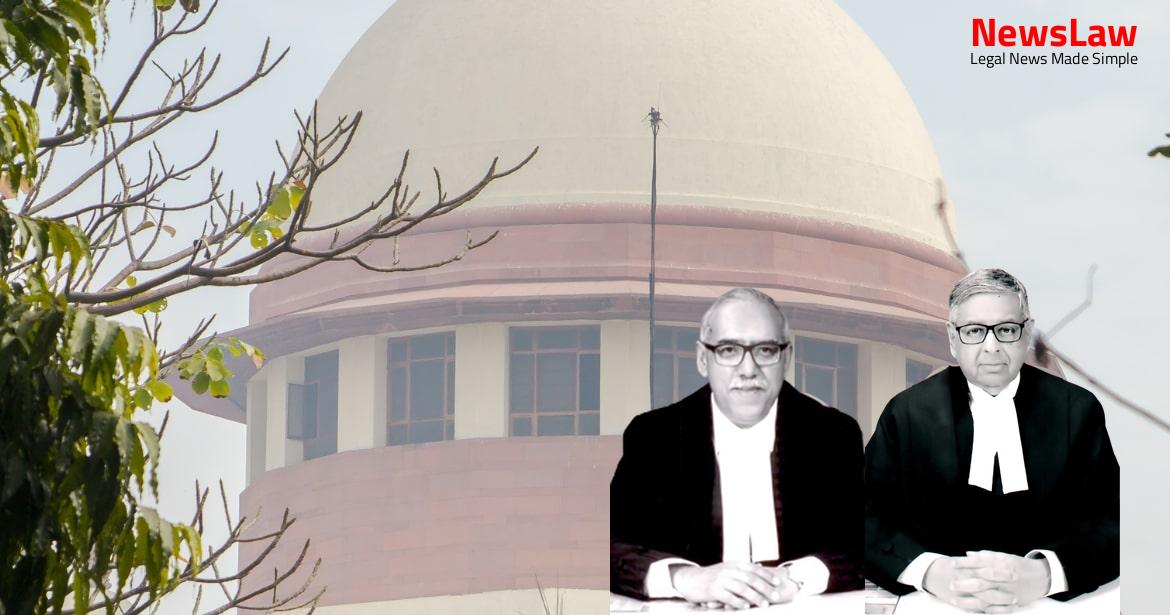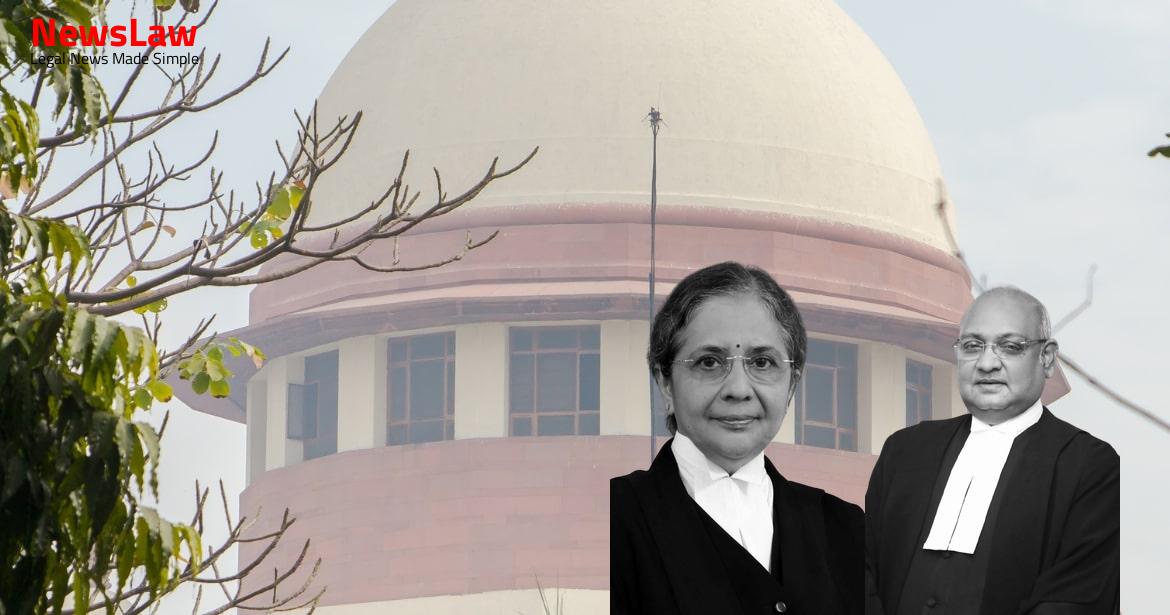Delve into the legal intricacies of the Family Court’s jurisdiction in cases involving the Muslim Women’s Protection Act. Analyzing the court’s legal interpretation and decision-making process in matters related to maintenance and rights of divorced Muslim women. Stay tuned to unravel the complexities of legal proceedings and the significance of legislative intent in ensuring equality and protection under the law.
Facts
- Appellant No.1, a Muslim divorced woman, filed a petition for maintenance under Section 125 Cr.P.C., but it was deemed not maintainable.
- Appellant No.2’s application for maintenance was accepted under Section 125 Cr.P.C., and the respondent was ordered to pay Rs. 2,000/- per month until appellant No.2 attains majority.
- The appellants filed Revision Petition No. 295 of 2009 before the High Court of Rajasthan for enhancement of maintenance.
- High Court allowed the revision petition filed by the respondent, setting aside the Family Court’s order which had converted the maintenance application under Section 125 Cr.P.C. into Section 3 of the Muslim Women (Protection of Rights on Divorce) Act, 1986, and also annulled the maintenance amount awarded to appellant No.1.
- The marriage between appellants No.1 and the respondent was solemnized as per Muslim rites, and they had a son, appellant No.2.
- Allegations were made that appellant No.1 was subjected to cruelty and harassment for additional dowry, leading to her being thrown out of the matrimonial home.
- Appellant No.1 amended the petition based on the divorce given by the respondent on 23-04-2008.
- A payment of Rs. 1,00,000/- was made by the respondent to appellant No.1 while the matter was pending before the High Court.
- The respondent also filed Revision Petition No. 221 of 2009 against the Family Court’s order.
- The Family Court’s order converting the application under Section 125 Cr.P.C. into an application under Section 3 of the Act was held to be without jurisdiction by the High Court.
- The High Court set aside the Family Court’s order in this regard and allowed the revision filed by the respondent.
- Appellant No.1 was given the liberty to file an application under Section 3 of the Act before the appropriate Magistrate.
- Appellant No.1 was allowed to retain the amount of one lakh rupees already paid, pending the final outcome of the Section 3 application.
- The maintenance amount awarded to appellant No.2 was upheld by the High Court.
- The Family Court, lacking jurisdiction, had ordered respondent Sahidul Haq to pay three lakh rupees to appellant No.1 as maintenance.
Arguments
- The learned counsel for the appellants argued that the Family Court has jurisdiction to decide cases under Section 3 of the Muslim Women’s Protection Act.
- The High Court was criticized for setting aside the Family Court’s decision and directing appellant No.1 to file an application under Section 3 of the Muslim Women’s Protection Act.
- The argument presented focuses on the jurisdiction of the Family Court in matters related to the Muslim Women’s Protection Act.
- An application under Section 125 Cr.P.C. by a divorced Muslim Wife requires the consent of both spouses to be governed by Section 125 Cr.P.C. as per the Muslim Women’s Protection Act.
- The Family Court does not have jurisdiction to entertain applications under Section 3 of the Act as the Act does not confer jurisdiction on family courts under Section 7(2) (b) of the Family Courts Act, 1984.
Analysis
- In Mohd. Ahmed Khan v. Shah Bano Begum and others (1985) 2 SCC 556, the Supreme Court upheld the right of Muslim divorced wife under Section 125 Cr.P.C. because Explanation (b) of Section 125 (1) Cr.P.C. includes a divorced wife till she remarries, giving a purposive interpretation to the law.
- Classification under a statute requires an intelligible differentia and a rational relation to its object, based on geographical, occupational, or other bases.
- The court may correct drafting errors in statutes to align with legislative intent, ensuring fair and reasonable provisions for all individuals.
- The Muslim Women (Protection of Rights on Divorce) Act, 1986 enshrines rights of divorced Muslim women for maintenance and fair provisions after divorce, to be decided by a Magistrate.
- Section 125 of the Cr.P.C. mandates a husband to pay maintenance to his wife, including a divorced wife, overriding personal laws of Muslims, highlighting the equality before the law and equal protection.
- The Act provides for reasonable provisions and maintenance for a divorced woman within the iddat period, along with protection of properties and assets.
- Judicial heroics may be required to address challenges arising due to conflicting laws on religious freedom and gender equality.
- The Act confers exclusive jurisdiction to the Magistrate, establishing a specific forum for redress.
- A divorced Muslim woman can opt for provisions under both the Act and Section 125 to 128 of the Cr.P.C. for maintenance.
- It is essential to interpret statutes in line with the legislative intent and ensure equality and protection for all individuals, regardless of religious or gender factors.
- The Family Court’s Act establishes Family Courts for speedy settlement of family disputes.
- The Act aims at conciliation and achieving socially desirable results.
- The Act allows for settlement before trial and eliminates rigid rules of procedure and evidence.
- The Act emphasizes equality before the law and equal protection of laws for all parties.
- Establishment of Family Courts provides women with access to justice in family-related matters.
- The Act allows for the receipt of evidence that may help effectively with dispute resolution.
- The Act has provisions for professional expert assistance and counseling services.
- The Act encourages efforts towards settlement between parties for family disputes.
- The Act gives Family Courts the powers of a Civil Court, while also allowing them to devise their own procedures.
- The Act overrides any other law inconsistent with its provisions for effective functioning.
- Family Courts Act prioritizes expeditious resolution of family matters and disputes.
- The Act allows for flexibility in procedures to foster amicable settlement between parties.
- Family Courts Act maintains the integrity of proceedings, emphasizing fairness and equality in legal representation.
- The Act promotes a woman-friendly legal system and policies.
- The provision of the enactment provides remedies beneficial to Muslim women divorcees by making the former husband liable to provide fair provision and maintenance.
- If the husband fails to comply with the order, the Magistrate may issue a warrant for levying the amount of maintenance and may sentence him to imprisonment.
- Relatives are also made liable under Section 4 of the Act.
- Section 7(1) applies when an application by a divorced woman under Section 125 or 127 of the Code is pending before a Magistrate.
- Establishment of a Family Court transfers pending cases to the Family Court when it is established.
- The Family Court provides a more informal and less intimidating atmosphere for family disputes.
- A divorced Muslim woman can proceed under Section 4 of the Act against relatives for maintenance.
- Section 3 of the Act entitles a divorced woman to maintenance, provision, and Mahr from her former husband.
- The Act ensures maintenance for the divorced woman beyond the iddat period.
- The rights provided by the Act are in addition to the relief of maintenance from the Criminal Procedure Code.
- The Act is to be interpreted in a manner that benefits women of the Muslim community.
- International human rights conventions emphasize equality and non-discrimination based on religion.
- The establishment of Family Courts under the Family Courts Act promotes conciliation in family disputes.
- The Act provides jurisdiction to Family Courts for family matters, irrespective of the religion of the parties involved.
- The Act allows divorced couples to be governed by provisions of the Code of Criminal Procedure if they choose to do so.
- Conclusion: A Muslim husband is liable to provide reasonable and fair provision for the divorced wife, including maintenance beyond the iddat period.
- The Family Court had jurisdiction to convert the application from Section 125 of the Cr.P.C to Section 3 of the 1986 Act for Muslim Women.
- The Family Court was within its rights to decide on the converted application.
- The reasons for the Family Court’s jurisdiction in this matter were discussed and considered.
Decision
- The appeal is allowed.
- The judgment and order under appeal are set aside.
Case Title: RANA NAHID @ RESHMA @ SANA Vs. SAHIDUL HAQ CHISTI (2020 INSC 432)
Case Number: Crl.A. No.-000192-000192 / 2011



